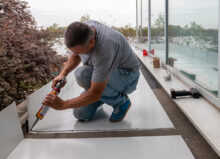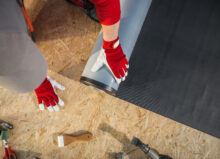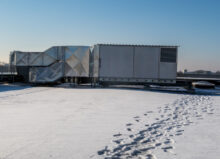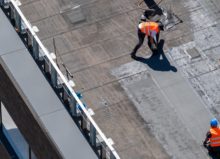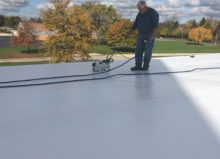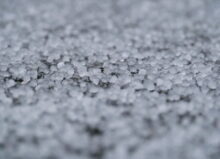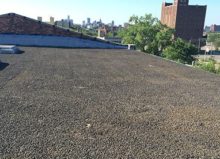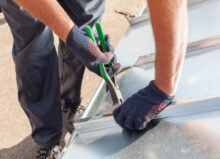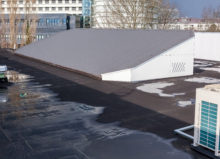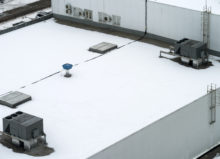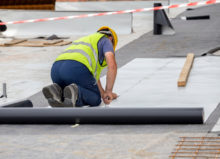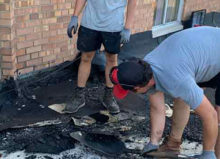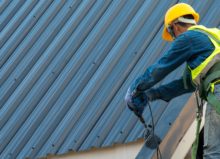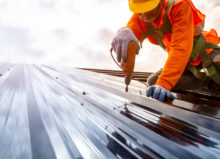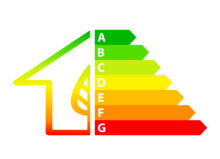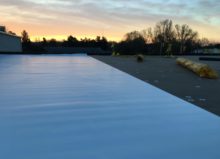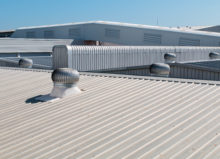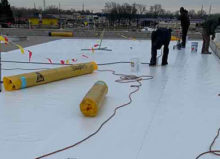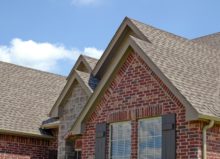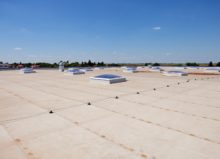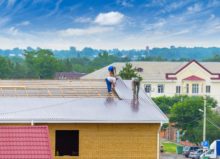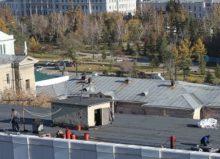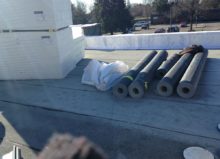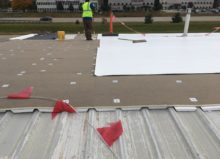What Are Commercial Flat Roofs Made Of?

As a leading provider of commercial roofing services, we understand that longevity and durability are critical factors in determining roofing material. However, many business professionals do not understand the roofing systems available or how each type benefits a business differently. Therefore, whether you operate out of a warehouse, small office or a large corporate headquarters, it is beneficial to understand the materials used in the installation of different flat roof systems.
Metal Roofing
While metal roofing is not a particularly new concept, some people may not consider it for flat roof construction. However, as two critical elements of a business are efficiency and reduced expenses, metal roofs should be considered, especially since metal surpasses many roofing materials in longevity, durability and sustainability. The life expectancy of some of these roof systems is nearly 60 years. Also, metal is known for its resiliency to the elements, and when these systems are correctly installed and coated, they can withstand tremendous abuse. Last, most metal roofing systems can improve the energy performance of a building and are often made from a percentage of recycled materials. However, while metal roofs do have significant strengths, they are quite challenging to repair if damaged, which is why many businesses choose to go with other roofing options, like PVC.
PVC Roofing
While it is only a single-ply roofing material, PVC or Polyvinyl Chloride is a heat welded approach to commercial roof types, which results in a watertight seal. More commonly referred to as vinyl roofing, PVC roofs can last up to 30 years. Also, PVC offers several advantages over traditional roofing systems. For example, these roofs are often light in color, which improves overall energy efficiency. Additionally, this material is highly resistant to fungi, water, UV and fire, making it an extremely durable option for most operations and flat roof setups. However, one of the most appealing things about this roofing material is that it is an Energy Star roofing product.
Ethylene Propylene Diene Monomer (EPDM) Roofing
EPDM or Ethylene Propylene Diene Monomer is one of the most cost-effective and popular roofs on the market. It consists of a synthetic rubber membrane, which is proven to last between 15 and 25 years, depending on the climate and other factors. This roofing material has been used by the commercial roofing industry for over 30 years and has proven time and time again its durability against hazards and extreme temperature fluctuations. Also, because the material is versatile and affordable, it is cheaper to repair in the event it is damaged. The other significant benefit of an EPDM roof is the ease of maintenance and its resistance to UV.
Modified Bitumen Roofing
The Atactic PolyPropylene or modified bitumen roofing system is another roofing material that is no stranger to commercial facilities. With over 30 years in development and use, modified bitumen combines fillers, polymers and asphalt to create a long-lasting, durable roofing system. Boasting easy repair and simple maintenance, these roofs are quite popular. However, rising insurance premiums are making this style of roof less cost-effective. Although, if you are not looking to install a new modified bitumen roof, but are more interested in maintaining the one you have, then it is possible to extend the life of the roof with simple repairs and save money.
Commercial Roofing Services
Commercial roofing contractors should be transparent about the materials they use and which options are the best for your particular needs. While every client likely comes into a meeting with a type of flat roof in mind, it is necessary for a contractor to help them understand if that really is the best option for their operation. Therefore, if you are interested in working with an honest and successful commercial roofing company, contact Summit Commercial Roofing and speak with one of our representatives at 734-228-4396.

